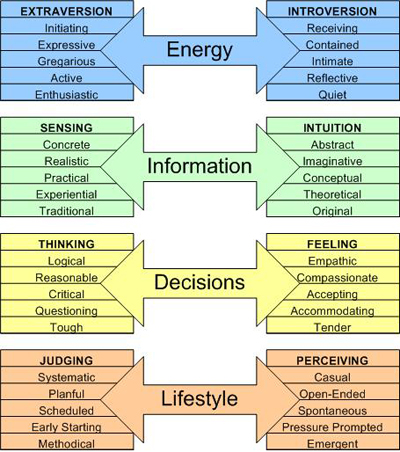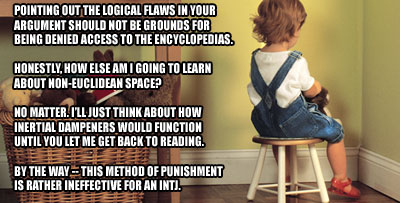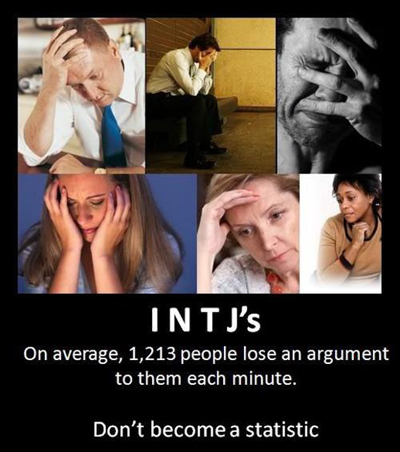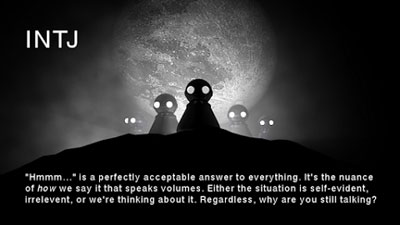Short answer: no, probably not. Longer answer: are you out of your cotton-pickin’ mind? I have heard some crazy questions in my time but this one…this one takes the cookie, the cake, and gets a special ticket for the short bus. Honestly, I know that it’s impolite to say that a question is stupid but I’m going to have to agree with DI Alec Hardy here and say:

Temperament does change over the course of a life. But, not drastically (absent drastic events) for most people. Most of the time, it’s pretty clear if you’re an I or an E (introvert/extrovert) by the time you start school. By the time you hit middle school, it’s usually clear if you’re an NT, NF, SP, or SJ (though there are arguments that parents can detect temperament in their children by the age of one year). By the time you’re in college, you have the personality type you’ll carry the rest of your life. Sure, you might be able to superficially act like a different type. You’ll be able to work on developing your intuition or your sensing, your thinking or your feeling. But using a cognitive function that is not your default setting will always require a bit of effort on your part. It’s not going to “come naturally” to you no matter how hard you try.

I’m an NT (INTJ). I can take all of the public speaking courses on offer and none of them are going to magically make me draw energy from hanging out with a large crowd of people. I can read all of the touchy-feely frou-frou crap out there and none of it is going to magically make me a feelings-oriented person. I can know how to use my five senses but all of the sensing tutorials on Earth aren’t going to get me to use S instead of N as my primary information-gathering resource. I have always gotten tired hanging out around a lot of people (with a handful of exceptions for relatives). I have always been a person who lives inside her head and is happy there. I have always been interested in seeing the “big picture” of things. I have always been curious, loved to learn things, a voracious reader, and unafraid of questioning anything (even when it got me in trouble. Younger INTJs with non-NT parents are cautioned not to stake a Devil’s Advocate position on the existence of God with your more traditional parents unless you want them to punish you by not letting you read encyclopedias).

I’m pretty sure I must have driven my mother crazy as I grew up. My mother is an ESFJ which is about as opposite INTJ as you can get. Even an ESFP would have been closer because the “P” would have meant she would have been more curious and open than the “J” which means being a bit more structural and wanting things done in a certain (preferably her) way. As an adult, I can deal with my mother better now than I could when I was a kid and, over time, she’s just learned to put up with me. Of course, knowing that she is ESFJ has made it a lot easier for me to figure out how to communicate with her and what things she assigns priority to. However, when I was growing up, my mother wanted to mold me into an ESFJ because, to her, that was the “best” way to be and I wanted to turn her into an INTJ because, to me, that was the “best” way to be. My (I’m guessing here) ISTP father often had to get between us to stop our fights from escalating into the verbal equivalent of nuclear war (at least on my end — my sarcasm was practically inborn).

See, to my mother, my introversion meant that I was “shy” and she kept telling me that “if I would just be more friendly” or “act better” then I would “have a lot of friends” because, to her, having a lot of friends and being well-thought of was important. I, on the other hand, didn’t want “a lot of friends.”* I wanted particular kinds of friends who I could talk to about the weird things I was interested in and who would read books with me. My mother wanted me to be more affable, approachable, warm, and thoughtful when it came to dealing with people whereas I wanted her to be more objective and open-minded and less likely to use “guilt by association” judging my friends (though, to be fair, she was right more often than not when I was a teenager). My mother (and my father) thought that “because I said so” or “because that’s the way it is” were acceptable conversation enders whereas I wanted to know why. I wanted to know what they thought about big events and the big picture (space exploration, could we build colonies on the moon, time travel, would either of them ever sign up to get on an interstellar space ship, what would have happened if the South won the Civil War, should there be a Federation-style global government…) whereas they were both more practical-minded and probably felt that my questions and obsessions were hare-brained and frivolous since none of them could make money, provide security, etc. My mother and I did (and still do, sometimes) a lot of talking past each other because neither one of us had the first clue how the other saw the world or how they thought. Looking back now, there were things my parents could have done to give me the answers I wanted and to stop the fights we had if they had known I was INTJ and what that meant. Also, if I were to be sent back a la Replay, I would have a better idea how to deal with both of them and communicate with them than I did growing up.

Thank God they had my little brother who (again, guessing here) was an ESTP. Otherwise, there might have been a mushroom cloud over our house by the time I’d turned fifteen.
So, I had two non-Rational parents and a non-Rational brother growing up and, despite the pressure, I didn’t magically change temperament. I also grew up in an area (the Deep South — specifically Mississippi) where Rational traits were not desired (not discouraged — just not considered desirable) in a woman (on average). Chances are that I went to school with only a few dozen other Rationals (school population was ~2000) and, despite being constantly around and under peer pressure and social pressure to conform, I stubbornly remained an NT.

Therefore, I doubt that it would be possible to take non-NT girls and somehow change them into Rationals for the purpose of having more women in science. I was unsuccessful in instilling an NT-temperament in my mother. I doubt that my niece (with whom I would have a disproportionate influence due to being an authority figure and “cool”) will be a Rational (she shows a lot of signs of being either an SF or an NF). And, even if there were some way to “force” a temperament change to NT, it probably wouldn’t be ethical or legal since you’d either have to brainwash a child (like Borg assimilation) or you’d have to place someone in severe psychological and emotional distress with development of NT traits being the only way for them to survive.

Now, can we “create” more NT women without violating laws on assault, kidnapping, and torture? Honestly, I’ll have to think about that one for a bit.
— G.K.
*Of course there were points where I wanted to be well-liked and respected. The thing is, I wanted it to be for things I knew or had accomplished, not for things like how I dressed or looked. I wanted to be popular because I wrote a great story or had the coolest science project or something (actually, winning first place in the Science Fair in fifth grade still counts as one of my Top Five Coolest Events from when I was a kid). I wanted to be known for what I had done or learned, not just for status-signaling or something stupid like that.













Women In Science Part III: Can We Force More Women To Become NTs? http://t.co/p4Ao6MphfH
RT @GKMasterson: Women In Science Part III: Can We Force More Women To Become NTs? http://t.co/p4Ao6MphfH